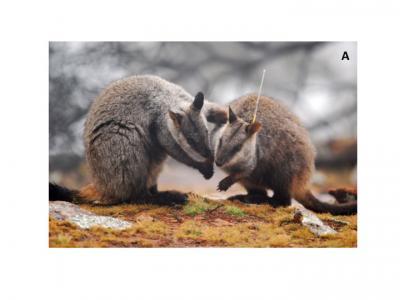Endangered brush-tail rock wallabies raised in captive breeding programs carry antibiotic resistance genes in their gut bacteria and may be able to transmit these genes into wild populations, according to research published May 22 in the open access journal PLOS ONE by Michelle Power and colleagues from Macquarie University in New South Wales, Australia.
Brush-tail rock wallabies are currently being raised in species recovery programs and restored to the wild to bolster populations of this endangered species. Here, researchers found that nearly half of fecal samples from wallabies raised in these programs contained bacterial genes that encode resistance to streptomycin, spectinomycin and trimethoprim. None of these genes were detected in samples from five wild populations of wallabies. The authors add, "How these genes made their way into the wallaby microbes is unknown, but it seems likely that water or feed may have acted as a conduit for bacteria carrying these genes."

A wild brush-tailed rock-wallaby meets an animal released from a captive breeding program (on right, with radio tracking collar).
(Photo Credit: Hugh McGregor)
Previous research shows that proximity to humans can increase animals' exposure to antibiotic resistance genes and the organisms that carry them. Antibiotic resistant bacteria have been reported in the wild from chimpanzees in Uganda, Atlantic bottlenose dolphins and a wide range of fish, birds and mammals. According to the researchers, their findings highlight the potential for genes and pathogens from human sources to be spread. Power says, "We found that antibiotic resistance genes from human pathogens have been picked up by endangered rock wallabies in a breeding program, and may spread into the wild when the wallabies are released."
Source: Public Library of Science